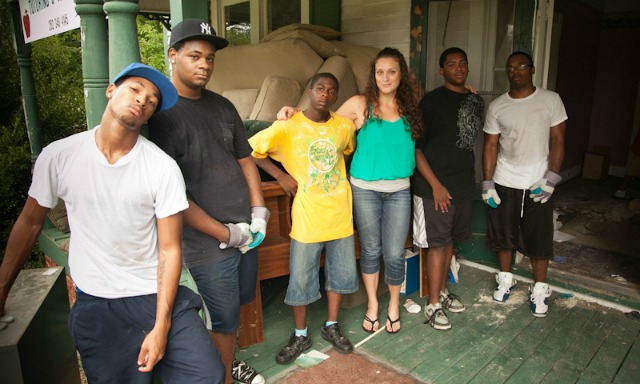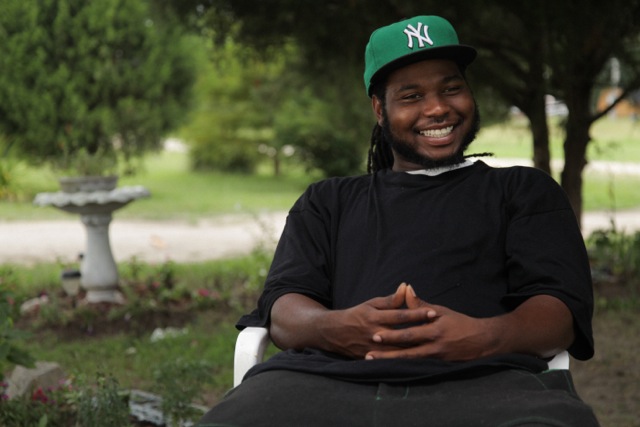'Raising Bertie' Director Explores Institutional Racism & Rural Black America
By Stephen Gossett in Arts & Entertainment on Nov 18, 2016 3:20PM

Director Margaret Byrne with subjects of 'Raising Bertie'
It’s impossible to watch Raising Bertie, a deeply felt documentary about three young black men coming of age in rural North Carolina, and not be reminded how the misguided post-election directive to empathize with certain residents of low-opportunity rural America callously fails to extend to people of color.
Co-produced by celebrated local documentary house Kartemquin (Hoop Dreams, The Interrupters) and directed by UIC grad Margaret Byrne, the film charts an intimate, six-year chronicle in the lives of Reginald “Junior” Askew, David “Bud” Perry and Davonte “Dada” Harrell, giving fully fleshed portrait of a highly underrepresented bloc of the contemporary American moment.
The young men are pitted against a multitude of roadblocks—systemic educational failures, split and damaged families, the specter of prison, a deficit of quality job prospects. At the same time, Byrne shows no interest in “poverty porn,” instead showing us lives that are rich, nuanced and—despite obstacles and errors in judgment—deep with resilience.
In Bertie County, North Carolina, the steadfast resolve of leaders at the community-focused experimental educational facility (The Hive) is as palpable as the shadow of mass incarceration and the threat of bankruptcy. As the film kicks off its first Chicago run, we spoke with Byrne about the dearth of rural black stories, the long legacy of institutional racism in the South and making docs with Kartemquin.
Chicagoist: The film spans so many several years and multiple lives. How does such a large-scale project like this germinate?
MARGARET BYRNE: I’ve had some experience working on longitudinal documentaries, with American Promise. I shot on that film of for about eight years. And that follows the lives of two African-American boys at a school in New York City from kindergarten until college. I was working on that film at the time that I first visited Bertie and this school called the Hive, I realized there aren’t that many rural stories being told. It was clear to me that rural communities are underrepresented in the media. Meeting these young men and Vivian, who ran the school, I was compelled to make the film. And I was only planning on filming for one year, but the school shut down very early into filming, and we had to decide what direction to go in. We realized it was really about the lives of these three young men and how they’d move forward.
C: With a prison essentially right down the street from the boys' school and not a lot of economic opportunity in the area, there's a strong sense of tough odds.
MB: The largest employer in Bertie County is a Perdue Farms factory; and the second largest is the county school systems; and the third largest employer is the Bertie correctional institution, which was expanded a few years ago. There’s not a lot of opportunity. Multiple people in the film drive over two hours to a different state (Virginia) to work at a pork plant. When you’re willing to do that, it says a lot about the economic opportunity in Bertie.
C: In the time since the film was made, North Carolina has become something of an epicenter of racial tension, with voter suppression and Klan rallies becoming national news. Even as Bertie is predominantly black, that history seems palpable.
MB: Yeah, Bertie County is 80 percent African-American and majority African-American-led. In the film, through their experiences, you can see institutional racism very much has an influence on their life. The only statistic in the film is that 27 prisons within a 100-mile radius of Bertie County. Each one of those guys growing up had somebody close who was in prison, and had a fear of going to prison. I think you can see a clear lineage in the South from slavery to sharecropping—Vivian’s father was a sharecropper—through mass incarceration. So many particularly young African-American men missing from the community because of prison. We don’t give them the same opportunity to make mistakes and have a second chance as we do to, say, my brother, who’s the same age as Bud and is white, grew up in a suburban community, but that was something he never thought about. But he was doing the same things as a kid. But we don’t allow young black men to be kids.

Davonte "Dada" Harrell in 'Raising Bertie'
C: The film feels very much in line with Kartemquin's legacy, both formally and thematically. Do you think of your film as posited within that legacy now?
MB: Absolutely, it’s an honor to be a co-production of Kartemquin, and this film is part of their collection. To come out on their 50th anniversary is also a great honor. When I moved to Chicago, the MacArthur Foundation, who supplied me a grant, recommend I talk with Kartemquin. At the time I was sort of flying solo. What I really needed was a community. You can’t make a film by yourself, especially one as complex as this. I really needed insight from other filmmakers and community members. We did all the post-production there. Gordon Quinn is a documentary genius, a guy who knows what your film is about before you do. Having the privilege to work with him has been one of my favorite things about the process. I never could’ve imagined I would come back to Chicago and find such a support system.
C: Speaking of support, a film of this kind seems impossible without a deep trust between filmmaker and subject. How was that achieved?
MB: I think trust is an exchange, and I think it was important that we spent a lot of time there with the camera off. We didn’t come with the expectation of let’s shoot, get this done, go home. We’d stay weeks at a time and spend time with their families, spend time in the community, to fully understand what’s going, understand their lives—especially as an outsider, a white woman from the city coming to this black rural area. It takes a lot of time to earn trust. You have to be a constant in their lives. They knew they could talk to us whenever they needed to. Having that strong relationship is key to tell the story authentically.
C: Watching Raising Bertie, I was struck by both the universality and the distinctiveness of the young men's stories and experiences.
MB: Yeah, there are very distinct differences in rural communities versus urban communities, but there are also so many similarities. When you get to know these guys, you find so many commonalities. So that’s why I think this movie, I hope, their stories will help us to connect to rural communities in a deeper way. Particularly now, post-election, it’s so important we have a dialogue with our rural communities. Clearly they are important, and they do matter.
In the mainstream media, there’s a stereotype of rural people. We’re not seeing everybody that should be represented.
RAISING BERTIE - Junior visits his Dad in prison from Kartemquin Films on Vimeo.
Raising Bertie runs Friday, Nov. 18 through Wednesday, Nov. 23 at the Gene Siskel Film Center. Times and tickets are available here. Director Margaret Byrne and other guests are scheduled to appear at select screenings.